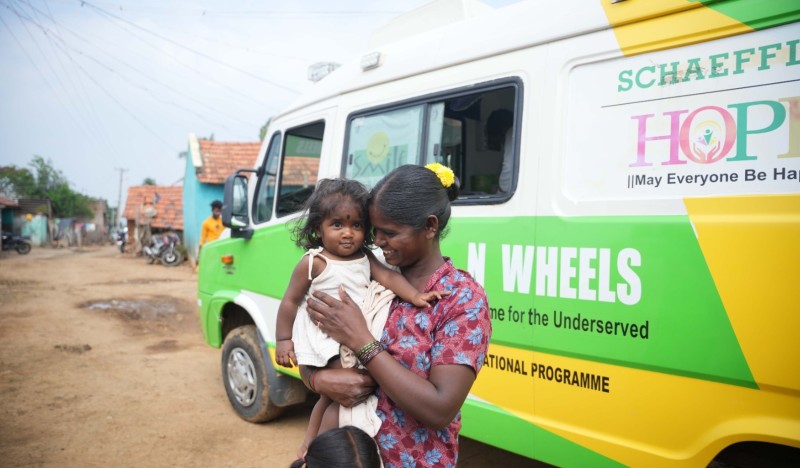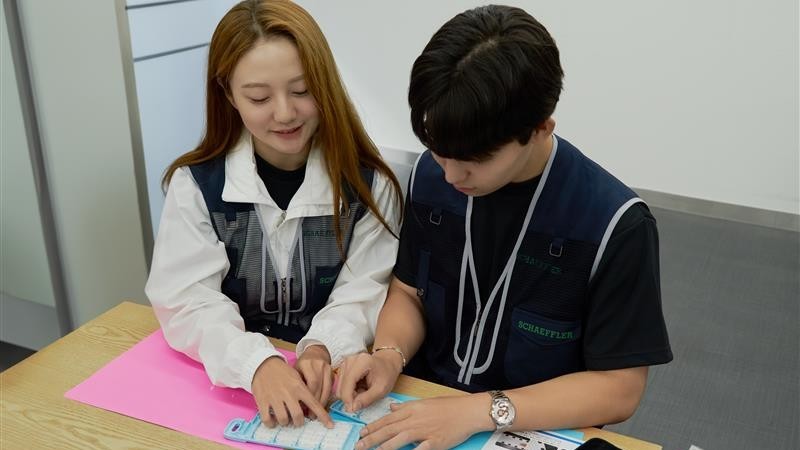Through its strategic partnerships and initiatives, Schaeffler is co-creating a more sustainable future with an impact that outlasts generations.
In the race for decarbonization, there are no solo winners. At Schaeffler, sustainability is the team sport in which we play together with industry partners and our value-chain to transform systemic challenges into shared victories. Our partnership-driven model turns ambitions into measurable action, proving that sustainability’s complexity demands collective intelligence.
As a leading motion technology company, we have always moved the world forward. But today, motion needs to be more than efficient - it must be responsible, circular, and carbon-conscious. The transformation that we are driving goes beyond its own sphere; we are engineering an ecosystem of sustainability that extends across supply chains, universities, industry alliances, and government corridors.
A Shared Vision for The Region
As The Motion Technology Company, Schaeffler considers sustainability as a holistic and overaching topic, and assumes ecological and social responsibility throughout the entire value chain. With our climate action plan, we implement climate protection measures and especially the reduction of GHG emissions worldwide. Our eyes are on our decarbonization strategy, and our teams in Asia Pacific are championing early engagement and shared responsibility across the ecosystem, materialising the blueprint in Schaeffler’s Climate Action Plan and Roadmap 2025.
Schaeffler transcends checklists in India by embedding double materiality, assessing both financial risks and societal impacts across operations. These shapes targeted initiatives like water stewardship and biodiversity protection, aligning with national BRSR (Business Responsibility and Sustainability Reporting) mandates while advancing Schaeffler’s global decarbonization strategy.

Our Korean operations offer a compelling case study in how smart regulation can spark real change on the factory floor. Working within Korea's Emissions Trading Scheme, we have rolled out practical upgrades from inverter compressors to optimised HVAC systems that deliver tangible energy savings. The results speak for themselves: verified improvements in energy efficiency that meet both EMAS audit standards and Korea's national greenhouse gas reporting requirements. When carbon constraints are reframed as creative challenges, we go beyond just meeting today's standards and help co-author tomorrow's playbook for sustainable manufacturing.
Sustainable Supply Chains is Not Just a Buzzword
This internal transformation extends naturally into our broader ecosystem of partners and suppliers. Every Schaeffler product tells a story that begins long before it reaches our factories—in the mines, foundries, and workshops of suppliers across our global network. Using Sustainability Target Agreements (STAs), top-down mandates are replaced with joint commitments built on trust, transparency, and metrics that matter.
Our suppliers complete standardised self-assessments (SAQs), aligned with the Drive Sustainability initiative. They sign up to Schaeffler’s Code of Conduct, participate in workshops, and adopt greener practices, from conflict-free mineral sourcing to using 100% renewable electricity. A global anonymous reporting system enforces accountability, while Schaeffler’s supplier portal offers free training on human rights due diligence and carbon accounting, turning compliance into capability.
But it’s not all hard edges. Schaeffler celebrates supplier wins too, with awards for climate neutrality, supply chain resilience, and innovative sustainable solutions. Because true partnership isn't about raising the bar; it's about lifting each other over it.
Growing Sustainability know-how from the Ground Up
The most ambitious sustainability plans mean little without people who know how to bring them to life. That's why Schaeffler's transformation starts with our own workforce; not through top-down mandates, but by giving employees the knowledge and confidence to drive change from wherever they sit in the organization.
The Schaeffler Academy has become the cornerstone of this approach. What makes it work isn't just the comprehensive curriculum—though the multi-language modules covering everything from climate science to circular economy principles are impressive. It's that our programs meet people where they are, whether they're engineers in Germany thinking about material choices or procurement specialists in Thailand evaluating suppliers.

The real breakthrough happens when sustainability stops being a separate concern and becomes woven into how people naturally think about their work. An operations manager starts seeing waste reduction opportunities. A product designer considers end-of-life recyclability from day one.
Decarbonization and carbon pricing are now being seriously considered, and these topics are at the center of many current discussions.
This kind of cultural shift doesn't happen overnight, but when it does take hold, it's remarkably powerful. Because the people closest to the challenges are often best positioned to solve them—they just need the right tools and perspective to see the possibilities.
Building Stronger Communities, Together
But developing our own people is just the beginning. True sustainability impact reaches far beyond corporate walls, and extends into the neighborhoods and cities where we live and work. Across Asia Pacific, we have discovered that the most meaningful progress happens when global expertise meets local insight, supporting initiatives that communities themselves identify as priorities: better healthcare access, educational opportunities, environmental stewardship, and pathways for young people to thrive.
Take India's HOPE program, which has grown into something quite remarkable. What began as a commitment to community support now includes mobile medical units reaching remote villages and vocational training programs that open doors to better livelihoods. It's the kind of holistic approach that recognizes health, heritage, and human potential as interconnected pieces of the same puzzle.
In Korea, the EVERGREEN program takes a different but equally thoughtful approach. University students become Schaeffler's CSR ambassadors, leading sustainability campaigns and volunteer efforts in their local communities. The result? A generation of young leaders who understand that responsible business isn't just good practice - it's essential for the future they're inheriting.
These grassroots programs aren’t side projects, but a reflection of our belief that long-term sustainability must be inclusive, empowering both people and communities to co-create the future of motion.


A Future in Motion, Together
At Schaeffler, sustainability isn’t about being the loudest voice in the room. It’s about being the most connected. In a region as dynamic and diverse as Asia Pacific, the future won’t be forged by lone disruptors, but by synchronised ecosystems.
So, whether it’s writing supplier agreements, nurturing sustainability champions within our own workforce, or partnering with communities to create lasting local impact, one thing is clear: the future of motion is shared. It's built by people who understand that meaningful progress happens when technical expertise meets human insight—when global ambition serves local needs.
This is how Schaeffler pioneers motion - with purpose, partnership, and a shared commitment to progress.
